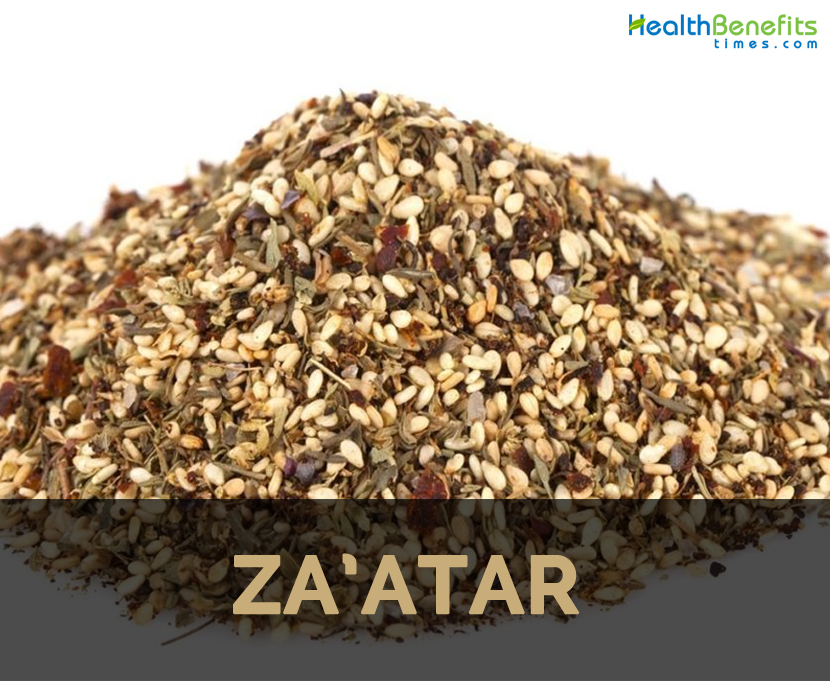| Za'atar health benefits Quick Facts | |
|---|---|
| Name: | Za'atar health benefits |
| Origin | It is inherent to Eastern Mediterranean region and used as staple ingredient in Lebanon, Greece, Syria and Turkey. |
| Taste | Tangy, nutty, herbal, toasty |
| Health benefits | Chronic ailments, Respiratory health, Enhance cognition, Lower inflammation, Provides energy |
History
It is inherent to Eastern Mediterranean region and used as staple ingredient in Lebanon, Greece, Syria and Turkey. Za’atar is the condiment used widely in Egypt, Armenia, Algeria, Israel, Iraq, Jordan, Lebanon, Jordan, Morocco, Libya, Saudi Arabia, Palestine, Tunisia, Syria and Turkey.
Za’tar plant is used in Ancient Egypt. It was known as saem to Ancient Egyptians. It was used as a vital ingredient in Arab cuisines from the medieval times. It has historical importance for Palestinians as the signifier of Palestinian household. It was once used in Arab bakeries but now it is common in Israeli cuisines.
Health Benefits of Za’atar
Za’atar is loaded with organic compounds as well as nutrients such as gallic acid, thymol, quercetina and carvacrol. It is quite popular in the Middle East and other parts of the world. It is widely used in salads and also as seasonings in vegetables and meat. It has tangy, toasty and nutty flavor. It is packed with minerals, flavonoids and nutrients which works wonder for the health.
- Chronic ailments
Sumac provides adequate amount of quercetin which helps to eradicate free radicals and also prevents the chances of cancer proliferation. The study shows that the organic components of sumac found in Za’atar can enhance protection against chronic ailments and cancer. (1)
- Respiratory health
When it is brewed as tea, it provides expectorant properties. Thyme clears the respiratory tracts which cause to cough out mucus and phlegm. It is also effective against colds. The immune enhancing properties help to prevent illnesses. (2)
- Enhance cognition
Za’atar has cognitive impact and improves memory. The people keep za’atar under their pillow. It boost the circulating powers and enhance brain power as well as neural activity. (3)
- Lower inflammation
It is used as salve or paste on the inflamed areas such as aching joints and bug bites. If consumed, it provides anti-inflammatory properties for gout, arthritis, stomach and respiratory system. (4)
- Provides energy
Za’atar has high content of flavonoids and polyphenols which boost the metabolism. Moreover, it provides restful sleep due to the presence of magnesium. (5)
- Enhance mood
The study shows that Za’atar helps to improve mood and lower depression. Oregano and thyme has phenol which enhance mood with the impact of regulating hormones. Carvacrol is associated with increase in energy and cognitive functions. (6)
- Bone health
It has high content of copper, calcium, magnesium and iron. The regular consumption of Za’atar helps to prevent the risk of osteoporosis as well as degenerative bone conditions. (7)
- Assist circulation
Za’atar helps to promote oxygenated blood circulation due to the iron content. Iron is essential for the formation of hemoglobin which transports red blood cells all over the body and organs. (8)
- Strengthen immunity
Za’atar has anti-microbial, anti-fungal and antiseptic properties. If applied externally and internally helps to maintain skin, gut, nervous system, respiratory system. (9)
- Skin health
This spice has anti-inflammatory properties promotes the skin’s appearance, speeds healing of wounds and also lowers the blemishes and age spots. (10)
Traditional uses
- Za’atar is used to lower internal parasites.
- It assists digestion and prevents the chances of allergic reactions.
- The mixture of Za’atar, honey and boiling herb treats whooping cough, stomach problems, sore throat and catarrh.
- It refresh mood, stimulates brain and improve memory.
- It acts as anti-inflammatory properties which help to cure psoriasis and eczema.
- It also treats insect bites.
- It cures conjunctivitis, pink eye and styes.
Precautions
- The allergic people should not use Za’atar.
- It should be consumed in moderate amounts.
How to Eat
- It is used in Levantine cuisines as a spice or herb.
- It is consumed with pita, dipped in olive oil.
- It is used as seasoning for vegetables and meats.
- It is also consumed with labneh, bread and olive oil.
- The leaves of Za’atar are used to make salad.
- It is sprinkled on salads, vegetables, kebabs and meatballs.
- It is used as a dry rub for the roast chicken.
- Zahtar could be cooked with sautéed vegetables such as potatoes and cauliflower.
- It is also sprinkled on yogurt.
Za’atar facts
Za’atar is the spice which is made by blending sesame seeds, dried herbs and sumac as well as salt. It dates back to 13th century. It is mostly used as a table condiment which is stirred in some olive oil. In Lebanon, it is dusted on oatmeal, eggs and yogurt. It was derived from the Greek word “Thumus” which means courage of strength. It was used to treat infections of bacteria and fungus for medical purposes.
| Name | Za’atar health benefits |
|---|---|
| Native | It is inherent to Eastern Mediterranean region and used as staple ingredient in Lebanon, Greece, Syria and Turkey. |
| Common/English Name | Thyme, Persian za’atar, za’atar rumi, za’atar franji, zaatar, zatar, za’tar, zattr, zatr, zaktar, zahatar, satar, Donkey Hyssop, Desert Hyssop |
| Name in Other Languages | Arabic: zaetar (زَعْتَر); |
| Made from | Dried herb combine with sesame seeds, salt, dried sumac |
| Leaves | Spear shaped, long, thin, blade like |
| Flower | Pinkish-purple |
| Shape & size | Height: 3 feet |
| Color | Lighter, delicate |
| Flavor/aroma | Bright zesty/herbal |
| Taste | Tangy, nutty, herbal, toasty |
| Health Benefits |
|
| Traditional uses | The allergic people should avoid Za’atar. |
| How to Eat |
|
References:
https://en.wikipedia.org/wiki/Za’atar
https://www.organicfacts.net/health-benefits/herbs-and-spices/zaatar.html
https://www.thespicehouse.com/za-atar
Comments
comments
